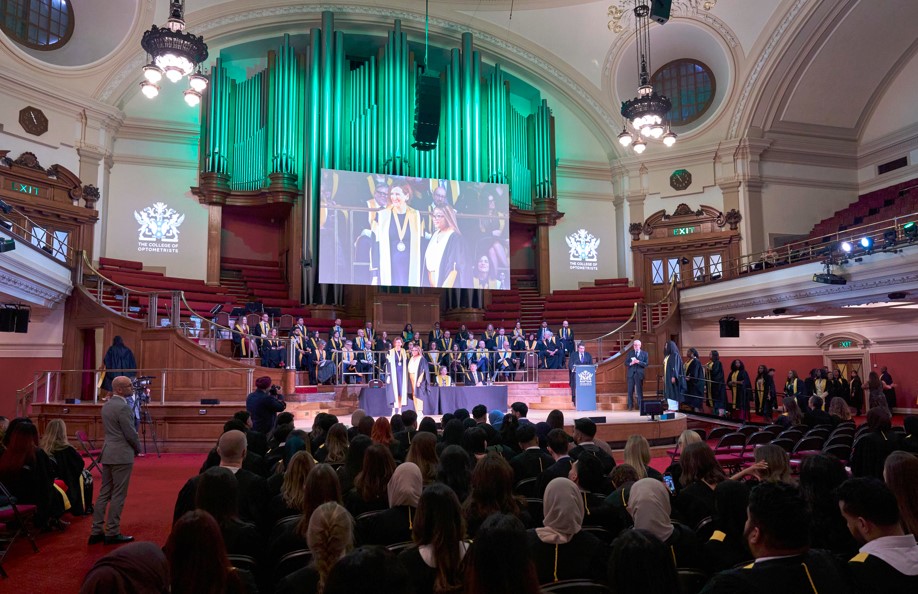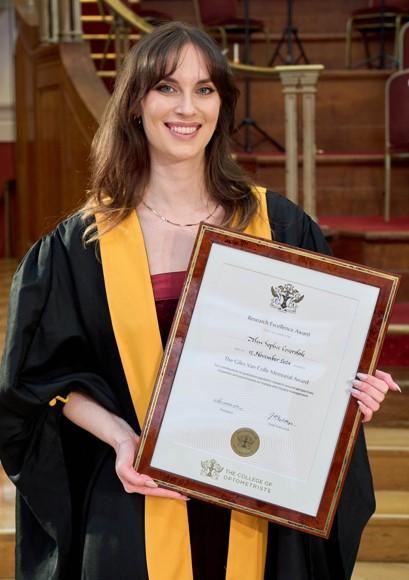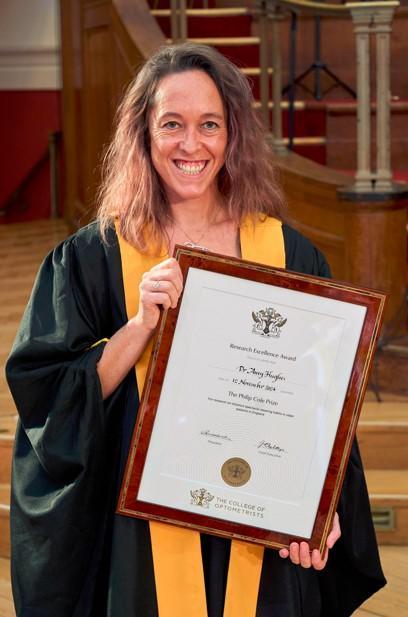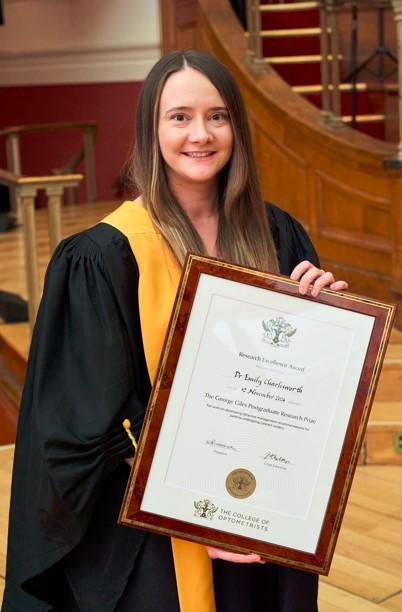Bradford optometrists win national awards for impactful research
Three optometrists who conducted research at the University of Bradford have been honoured in the College of Optometrists 2024 Research Excellence Awards.

Sophie Coverdale, who also teaches at the University of Bradford, together with graduates Amy Hughes (who completed her PhD in 2023) and Emily Charlesworth (who completed her PhD in 2022) received awards for their groundbreaking and impactful research.
Dr Neema Ghorbani-Mojarrad, from the School of Optometry and Vision Science, said: “These awards demonstrate how the hard work of Bradford PhD students impacts the optometry profession and it is recognition for them and the School at a national level.”
Commenting on Sophie’s award, he said: “We are really pleased Sophie’s work, in collaboration with colleagues in the department, has been recognised. Her work has made an important contribution to discussions around the treatment of myopia, especially in identifying barriers to the uptake of new and existing treatments.”
Professor David Elliott, from the School of Optometry and Vision Science, who supervised both Amy and Emily in their PhDs, said: “Amy and Emily are two brilliant researchers and clinicians who have done Bradford proud by winning these prestigious College of Optometrists awards. They are very well deserved.”
The College of Optometrists is the professional body for optometry in the UK. The College champions optometrists and the role they play by developing their knowledge and skills, defining good optometric practice, supporting optical research and innovation, and educating and advising the public on eye health.
President of The College of Optometrists, Dr Gillian Rudduck, said: “Without optometrists choosing to enter research and development, the knowledge and evidence base that underpins the discipline could not expand and strengthen.
“Advances in eye healthcare are increasingly important, as we face the challenges of an ageing population, the need for new optical materials that do not impact on our environment or climate, and the growing need to support our colleagues across the eye care pathways. Today’s awardees are among the most dedicated and talented individuals the profession has to offer, and they should all be immensely proud of what they have achieved.”
'Slowing down myopia' discussions

Sophie Coverdale, who will submit her PhD thesis in January, received the Giles Van Colle Memorial Award for her conducting qualitative paediatric research around perspectives of parents and practitioners on myopia and myopia management.
Her work may help overcome some of the barriers faced by both parents and optometrists when deciding what the best course of treatment is for children, especially if that involves specialist glasses and contact lenses that have been shown to slow down the progression of short-sightedness.
“There are a number of treatments available that reduce the extent and slow the progression of myopia, such as specialist glasses and contact lenses. However, myopia control treatment is not implemented consistently across the UK. While the progression of short-sightedness in children might not be seen as an urgent condition, it can lead to increased risk of degenerative conditions in later life, including retinal detachment, glaucoma and cataracts.”
Commenting on her award, she said: “It feels very rewarding to have my research recognised as having made an impact in the real world.”
Glasses wearing habits

Dr Amy Hughes, Clinical/Research Lead for Primary Eye Care Services, a not-for-profit eyecare service provider, received the Philip Cole Prize for her original research into for research on distance spectacle-wearing habits in older patients in England.
“We found a surprisingly large number of patients wore glasses full time even after cataract surgery. We also found the type of lenses available was the biggest deciding factor, the conclusion being that convenience was arguably the most important factor.
“This research will help optometrists have evidence-based conversations with patients who need cataract surgery, helping them understand what their preference will be after surgery. For example, I think there’s an assumption that patients want not have to wear glasses for distance post surgery but this was not borne out by this piece of research.”
She added: “I’m honoured to have received the award and have that recognition; it’s important to rec practice-based research, because this influences what we do for so many penitents every day. It was great to see such a strong turnout from Bradford.”
Pre and post-operative cataract patient recommendations

Emily Charlesworth received the George Giles Postgraduate Research Prize for developing refractive management recommendations for patients undergoing cataract surgery.
Commenting on her award, she said: “No Current UK recommendations exist regarding the refractive management of patients undergoing cataract surgery. Part of my PhD thesis involved developing evidence-based pre- and post-operative refractive management recommendations that have agreement between optometry and ophthalmology. The list of recommendations target areas of concerns found by patients including a lack of understanding of target refraction, difficulties between first and second eye surgery, how soon patients can get new spectacles after surgery, and post-operative driving advice.
“This research will help optometrists with their clinical decisions and target refraction discussions with patients. Current advice recommends patients obtain new spectacles four-to-six weeks following surgery, however my research found refraction was stable one-to-two weeks following surgery for the majority of patients. This will benefit patients in need of new spectacles following surgery.”
She added: “I really enjoyed my PhD at the University of Bradford and it’s an honour to have my research work recognised. I hope my work will benefit patients undergoing cataract surgery in the future.”
Optometry and vision science
The University’s School of Optometry and Vision Sciences offers a range of courses and is taught by high profile qualified optometrists, all with broad experience in optometric practice and teaching, many of whom are actively involved in academic research.
